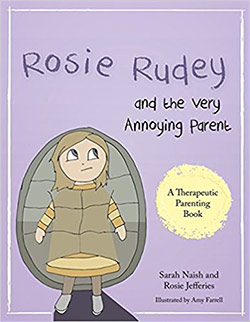The story of Rosie has been written in simple language that young children will understand. It is a literal tale of a child struggling with emotional and behavioural issues as she adapts to living with a new family. However, there is one notable symbolic device: Rosie has developed a hard tortoise shell around her body so ‘no one can give her cuddles or make her feel sad anymore’. Her difficult past has resulted in her anxiety and distrust of people, which manifests itself as anger, grumpiness and rudeness (the illustrations show Rosie stomping her feet loudly up the stairs, and glaring rudely at other people).
Her mum empathises with her, identifying how difficult it must be to be cross all the time. She avoids telling Rosie what to do directly or reprimanding her for her negative behaviour. Instead she describes her feelings and gives her space and time to resolve them herself. When Rosie announces she is so fed up with her family telling her what to do that she is going to run away, her mum doesn’t try to stop her (although she watches her and makes sure she is safe). Instead, she calmly points out that she thinks it is a bit sad, especially as it is raining. As Rosie packs to run away, her mum offers her a warm jumper and a coat (which she refuses). Rosie makes it as far as the front door step, and soon feels tired, cold and hungry. How dare her family have their tea without her! She ‘overhears’ mum very deliberately telling the others how difficult it must be for Rosie, feeling cross all the time. Very slowly, Rosie ‘peeps her head out of the tortoise shell’ and returns to the family meal, surprised that no-one seems particularly cross. Again, Mum is not judgmental and doesn’t show her own anxiety about the situation. Rosie has reached a turning point and slowly but surely, her shell begins to feel thinner.
Although undoubtedly beneficial as a therapeutic book, the story is a little dry and the unrefined illustrations don’t convey much emotion.
 Children who have had a difficult start in life, who are finding it hard to adapt to life within a new family, may benefit from this book. Children in other situations who are struggling with emotional and behavioural issues may identify with Rosie in the book, and, with the guidance of a parent or other trusted adult, may be able to take the first steps to improving their situation.
Children who have had a difficult start in life, who are finding it hard to adapt to life within a new family, may benefit from this book. Children in other situations who are struggling with emotional and behavioural issues may identify with Rosie in the book, and, with the guidance of a parent or other trusted adult, may be able to take the first steps to improving their situation.
